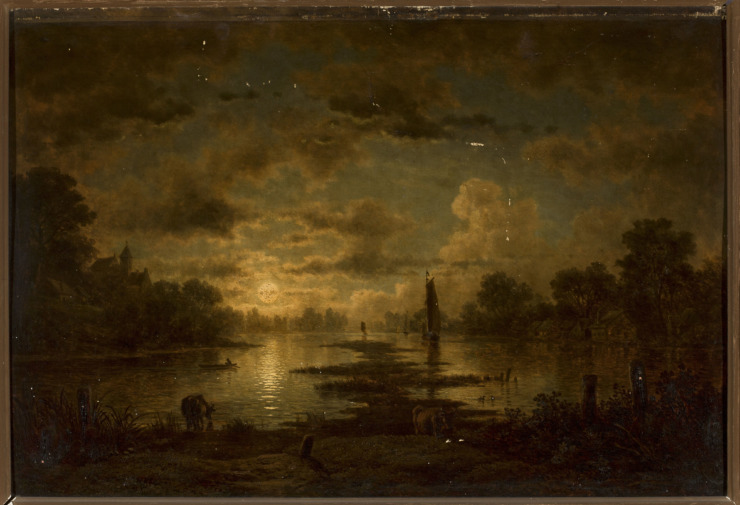< Return to Edgar Allan Poe Poems
The Lake
In spring of youth it was my lot
To haunt of the wide world a spot
The which I could not love the less—
So lovely was the loneliness
Of a wild lake, with black rock bound,
And the tall pines that towered around.
But when the Night had thrown her pall
Upon the spot, as upon all,
And the mystic wind went by
Murmuring in melody—
Then—ah, then, I would awake
To the terror of the lone lake.
Yet that terror was not fright,
But a tremulous delight—
A feeling not the jewelled mine
Could teach or bribe me to define—
Nor Love—although the Love were thine.
Death was in that poisonous wave,
And in its gulf a fitting grave
For him who thence could solace bring
To his lone imagining—
Whose solitary soul could make
An Eden of that dim lake.
—Edgar Allan Poe
Enjoy Artistic Representations of “The Lake” by Edgar Allan Poe

Moonlit night at the lake by Georg Eduard Otto Saal, 1859.

A North Woods Lake by Homer Dodge Martin, 1867.
Listen to Readings of “The Lake”
Listen to Musical Interpretations of “The Lake” by Edgar Allan Poe
That’s it for readings of The Lake by Edgar Allan Poe!
About Edgar Allan Poe
Edgar Allan Poe (1809-1849) published his first collection of poems, Tamarlane, and Other Poems, in 1827, when he was 18 years old. A tendency to run up debts (including for gambling) kept him in constant state of reinvention – college student, poet, short story writer, soldier/officer school, literary journal editor and critic.
The Poe who arises from Symons’ hand (his biographer in The Telltale Heart: The Life and Works of Edgar Allan Poe) is a man who first and foremost was determined to put Southern letters on the map, aiming to wrest control from the literary establishment in New York and New England (Poe aimed some rather pointed arrows at writers like Henry Wadsworth Longfellow). For his own writing, he wanted to be considered a poet. The poems were the important works; the stories were almost after-thoughts, almost dashed off primarily to raise funds. And he always needed money.
His personal life seemed to have stayed a general mess, but he had an enormous impact on both American and world literature. Consider the stories and poems that have been filmed, published, re-published, anthologized, celebrated and widely admired for more than 150 years: “Murders in the Rue Morgue,” “Fall of the House of Usher,” The Raven, “The Tell-Tale Heart,” Annabel Lee, “The Bells,” “Ulalame,” “To Helen.”
We associate Edgar Allan Poe with 19th century gothic. His stories are full of mystery, passion, horror, violence, death, and the supernatural. And yet his poems, especially “The Raven” and “Annabel Lee,” made him famous in pre-Civil War America and established his literary reputation.
Questions and mystery surrounded Poe’s own life and death, and continue even today – we may never know who left three roses and a bottle of cognac on his grave in Baltimore for decades until 2011 (alas, the “Poe Toaster” disappeared or died, to be seen nevermore).
You can read more about Poe’s biography in the articles Poets and Poems: Meeting Edgar Allan Poe and Forgotten Classics, The Telltale Heart by Julian Symons by Glynn Young, from which this biography was compiled.
I hope you enjoyed The Lake by Edgar Allan Poe!
BUY ‘HOW TO WRITE A FORM POEM’ NOW!
